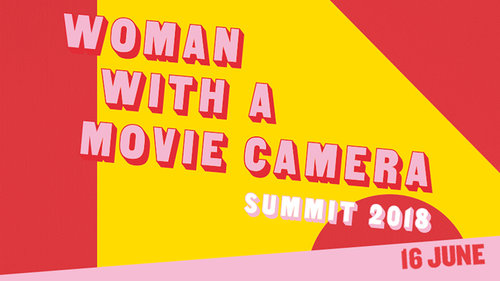I’m starting a new monthly feature here for recent, particularly interesting reads about cinema, feminism, and politics.
Here we go:
— A twitter thread by So Mayer on how film criticism needs to change; it is a response to a recent, poorly argued piece that asked, “Who needs film critics?”
— Pamela Hutchinson reports on the historic “Woman with a Movie Camera” summit at the BFI in London. Also see Anna Coatman’s report about the event.
— Moira Donegan on the divide within feminism between #MeToo and those who form the backlash to it, and how this divide is not necessarily generational, but one of competing visions of feminism, social vs. individualist.
— Lynsey Grosfield on freelance writing and the situation of women in it.
— J. Hoberman on his website, “Why I cannot review Jonas Mekas’s Conversations with Filmmakers”; an epilogue to Michael Casper’s piece on Jonas Mekas in the New York Review of Books.
— A group of Latinx critics zero in on aspects of representation in Sicario: Day of the Soldado that have been missed by most other critics.
— A round-table on Hannah Gadsby’s Nanette at the feminist, queer website Autostraddle. (If you haven’t seen Nanette, best to go in cold, without reading anything about it.)
— Eric Allen Hatch on being hopeful for the future of arthouse programming.
— Rebecca Solnit on the “politics of disconnection” in the world today.
— On Europe’s #MeToo debate and “the threat of change.”
— Sady Doyle on the pop culture roots of the Incel movement.
— The program notes for this intriguing film series at BAM (in Brooklyn) open with a Sara Ahmed quote (“If whiteness gains currency by being unnoticed, then what does it mean to notice whiteness?”). What a great idea: framing these mostly (over-)familiar movies (like Ferris Bueller’s Day Off, Pulp Fiction, Taxi Driver, Gran Torino, etc) through the lens of whiteness. Also see: Craig D. Lindsey’s article on the series in the Village Voice.
— A great interview with Alberto Toscano on the enduring importance of Marxism and reading Marx today.
— Shelley Stamp, who is curating Kino-Lorber’s “Pioneers: First Women Filmmakers” DVD/Blu-ray set:
“One of the most important messages I hope to convey is that so many of the debates we’re having today were actually settled 100 years ago. Can women direct action pictures? Yes. Can female leads carry pictures at the box office? Yes. Can “women’s issues” (like reproductive politics, sexuality, family life) appeal to a wide audience? Yes. Ignoring this history and continuing to debate issues that were settled so long ago makes today’s generation of female filmmakers think they have to reinvent the wheel…”
— Essential reading: Ben Tarnoff on big data and the need to democratize it:
“Big data is extractive. It involves extracting data from various “mines”—Facebook, say, or a connected piece of industrial equipment. This raw material must then be “refined” into potentially valuable knowledge by combining it with other data and analyzing it.
Extractive industries need to be closely regulated because they generate all sorts of externalities—costs that aren’t borne by the company, but are instead passed on to society as a whole. There are certain kinds of resources that we shouldn’t be extracting at all, because those costs are far too high, like fossil fuels. There are others that we should only be extracting under very specific conditions, with adequate protections for workers, the environment, and the broader public. And democratic participation is crucial: you shouldn’t build a mine in a community that doesn’t want it.
These principles offer a framework for governing big data. There are certain kinds of data we shouldn’t be extracting. There are certain places where we shouldn’t build data mines. And the incredibly complex and opaque process whereby raw data is refined into knowledge needs to be cracked wide open, so we can figure out what further rules are required.
Like any extractive endeavor, big data produces externalities. The extractors reap profits, while the rest of us are left with the personal, social, and environmental consequences. These range from the annihilation of privacy to algorithmic racism to a rapidly warming climate—the world’s data centers, for instance, put about as much carbon into the atmosphere as air travel.
Society, not industry, should decide how and where resources are extracted and refined. Big data is no different.”



Jonathan Rosenbaum
July 26, 2018 at 7:09 pm
Thanks for alerting me to Jim Hoberman's excellent and scrupulous letter. Now I have to
check out the other links…
girish
July 27, 2018 at 3:24 pm
Glad you found it of interest, Jonathan! There's been a healthy response to this post on Facebook and Twitter, which will spur me to keep doing this….
Peter Nellhaus
July 28, 2018 at 1:42 pm
Just read the Sicario 2 article. There are admittedly some problems with Sheridan's screenplay, especially as the majority of the narrative is not clearly connected to the opening scenes. That said, I watched the film, one of my rare times seeing a mainstream release theatrically, because of Stefano Sollima. Somebody tell Monica Castillo to do her homework. I haven't seen his debut feature, All Cops are Bastards which was up for the Italian Oscar, but I have seen his other feature, Suburra and his TV series work, the entire Romanzo Criminale and several episodes of Gommorah. The characters in Sollima's work are all criminals, big and small. There's no character who provides an easy moral center for the viewer in his work. Maybe the biggest problem was the unfortunate timing of the film's release. Political nuances aside, Sollima, son of Sergio Sollima, is a terrific action director.
You may want to check out Gommorah as one of the frequent directors on that series is Francesca Camerini, daughter of acclaimed director Luigi Comencini.
girish
July 29, 2018 at 7:47 pm
Had not heard of Francesca Camerini, thanks, Peter!
Alexander Horwath
August 4, 2018 at 3:12 pm
It's Francesca COMENCINI, I assume…
Peter Nellhaus
August 5, 2018 at 12:24 pm
I meant Comencini, not sure how I missed that misspelling of her name.
Gareth
August 7, 2018 at 4:08 pm
For some reason, the pieces on the BAM series reminded me that you were due to introduce a screening of Cold Water some weeks back. How did that go? I saw the film again at the weekend, at the Brattle Theatre — I think it was the third time on the big screen, after seeing it in 1994 and 1999, and it's an incredibly rich film, even more so now than I think I realized in my early- to mid-20s.
girish
August 8, 2018 at 2:47 pm
Thanks, Gareth–it was a lot of fun! I agree: the film holds up really well.
I was also happy to write the liner essay for the Criterion DVD/Blu-ray; it comes out next month.
Gareth
August 13, 2018 at 1:00 am
Well, I am off to pre-order that disc now!